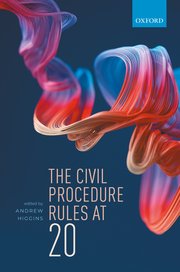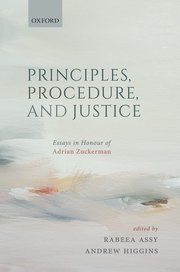The Civil Procedure Rules at 20
- ISBN: 9780198863182
- Editorial: Oxford University Press
- Fecha de la edición: 2020
- Lugar de la edición: Oxford. Reino Unido
- Encuadernación: Cartoné
- Medidas: 23 cm
- Nº Pág.: 328
- Idiomas: Inglés

Civil Procedure Rules at 20 is a collection of presentations and papers to mark the 20th anniversary of the CPR coming into force, many of which were delivered orally at the CPR at 20 Conference at the Bonavero Institute of Human Rights, at Mansfield College, Oxford, in 2019. The presentations and papers have been edited and extended to provide a permanent record available to a wider audience.
The book is dedicated to examining key challenges and changes facing the civil justice system, marking the 20th anniversary of the current civil procedures governing civil litigation in England and Wales. It addresses a range of technical, political, and controversial subjects on access to justice and the rules governing civil litigation, including the digitization of the justice system and the future role of artificial intelligence; the emergence of class actions; disclosure rules and reform; restrictions on Judicial Review challenges to Government decisions; closed material proceedings; and efforts to make the costs of civil litigation more affordable and proportional, including the availability of legal aid.
With a Foreword by Lord Briggs, the contributions come from those best qualified to tell this story, from senior judges, practitioners, and leading academic scholars each with their own unique perspective.
Part I: Introduction
1:The Civil Procedure Rules Twenty Years On: The Practitioners' Perspective, Damien Byrne Hill and Maura McIntosh
2:Keep Calm and Keep Litigating, Andrew Higgins
Part II: Judicial Presentations
3:Rule-Making For a Digital Court Process: The Civil Procedure Rules, Terence Etherton
4:Discovery: To Disclosure and Beyond, Peter Coulson
5:Transformation from First Principles, Ernest Ryder
6:Interventions in Judicial Review Proceedings, Nathalie Lieven
7:National Security, Closed Material Procedures, and Fair Trials, Martin Chamberlain
8:Civil Justice Reform: Where Next?, Rupert Jackson
9:Reflections from Former Masters of the Rolls on Managing Civil Justice, Kate O'Regan
Part III: Collective Redress
10:Taking Stock of the Collective Proceedings Regime in the Competition Appeal Tribunal - A Successful Compromise?, Stephen Wisking and Ruth Allen
11:Lord Woolf, Multi-Party Situations, and Limitation Periods, Rachael Mulheron
Part IV: Disclosure
12:Disclosure: Should We Have Stayed with the RSC?, Charles Hollander
13:Proportionality and Search-based Disclosure, Stuart Sime
Part V: Judicial Review
14:The Use of Empirically Based Information when Reforming and Evaluating Judicial Review, Maurice Sunkin
15:1. Reforming Judicial Review Costs Rules in an Age of Austerity, Joe Tomlinson & Alison Pickup
Part VI: Costs and Funding
16:The Overriding Principles of Affordable and Expeditious Adjudication, Rabeea Assy
17:The Long Struggle for Fixed Cost Reform, John Sorabji
Part VII: National Security
18:A Core Irreducible Minimum? The Operation of the AF (No. 3) Duty in the Closed Material Procedure, Hayley J. Hooper
Part VIII: Technology
19:Reform of Civil Justice, Richard Goodman
20:Artificial Intelligence in the Administration of Justice, Adrian Zuckerman







